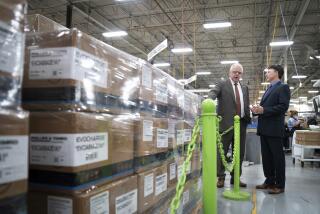Can lean times also be green times?
As the giant cargo cranes at the Port of Long Beach loomed behind him, Gov. Arnold Schwarzenegger last week cut quickly to a debate gaining intensity in his Republican Party: Should the state’s passion for environmental protection survive a foundering economy?
“When I came into office there was this kind of belief that you can only protect the environment or the economy, you have to choose between one or the other,” the governor said at an event staged to accept $26.5 million in federal clean air grants. He dismissed the argument bluntly: “We don’t have to accept that.”
His comments represented a push-back against one of his party’s candidates for governor, former businesswoman Meg Whitman. She is campaigning against Schwarzenegger’s signature achievement on environmental matters, the 2006 global warming bill.
She has argued, to much applause among her partisans, that such measures have harsh consequences for the economy and should be ditched for the time being.
“I reject environmental policies that do little for the environment and wreak havoc on California’s economic future,” she told delegates at the party convention, where her fliers featured bright blue sky and green grass. “You know what? Liberal environmentalists may not like jobs or people, but California needs both.”
The slap at environmentalists suggests Whitman’s electoral strategy: convince the conservatives who dominate the party’s primary that she is one of them and hope the more environmentally sensitive general election audience ignores the issue to focus solely on jobs.
But more generally, the debate suggests that Californians may yet have to ponder where the environment sits in their list of priorities.
The environment often has been a luxury item for California voters; though always a concern, it has tended to rank higher in interest when economic times are good. Whitman’s argument is not the standard GOP approach -- ignore the environment in bad economic times -- but an effort to throw blame for the bad economy at the feet of environmentalists.
Without going that far, some Californians already are changing their views on the environment, as indicated by a July poll from the Public Policy Institute of California. Sixty-six percent of Californians, for example, supported the global warming bill signed by Schwarzenegger; though still in landslide territory, support had dropped from 73% last year. Institute president Mark Baldassare said some of the slippage is no doubt because of the economic downturn, but some also is the result of partisanship.
The state’s global warming bill, he noted, represented agreement by the Republican governor and the Democratic Legislature, the kind of bipartisan effort voters say they want. Now, however, the global warming dispute has moved to Washington, where the Democratic White House and Republicans in Congress are entrenched in battle and where the state’s junior senator, Democrat Barbara Boxer, this week opened debate on a climate change bill in the Senate environment committee, which she chairs.
The decline in support for the global warming effort in California was largely partisan. Democratic support dropped only from 83% to 78%. Among Republicans, however, support dropped from 57% to 43%. It is “a much more partisan context now,” Baldassare said.
Both environmentalists and the governor are trying to wrench the issue out of the partisan maelstrom, however unlikely that is. Part of their difficulty is the economy itself. Unemployment in California is in the double digits, far more than double what it was when the global warming bill was signed. So environmentalists and the governor are having to argue that things would have been even worse if not for green jobs.
An imperative, Sierra Club California director Bill Magavern said, is to convince Californians that “there’s no cause and effect there.”
“Unemployment is up because of the housing bust and the market crash and the meltdown caused by deregulation gone wild,” he said, not because of environmental measures.
That argument is even more of an imperative for Schwarzenegger, whose successor will be elected in 13 months. The environment stands as his surest legacy -- assuming that, at the end of his tenure, voters see environmental measures as a plus.
With California broke, his luck depends on federal largesse. Federal officials have helped out by siding with California in its efforts to regulate tailpipe emissions. More than that, they have showered the state with money.
On Wednesday, Schwarzenegger beamed as he announced $26.5 million in federal grants for clean vehicles and jobs at the port and elsewhere. On Friday, he announced $27 million in grants, much of it federal, to help train a “clean energy workforce.” In between, he helped preside over the Governors’ Global Climate Summit in Century City, where he announced plans to attend a fall summit.
“Economic growth and environmental protection are the two issues he’s really focused on during his time as governor, and he will continue to make the case it isn’t either-or, it’s both,” Baldassare said.
Whatever happens with the rest of Schwarzenegger’s tenure, he said, “climate change is on the highlight reel.”
Each Sunday, The Week examines implications of major stories. It is archived at latimes.com/theweek
More to Read
Sign up for Essential California
The most important California stories and recommendations in your inbox every morning.
You may occasionally receive promotional content from the Los Angeles Times.











